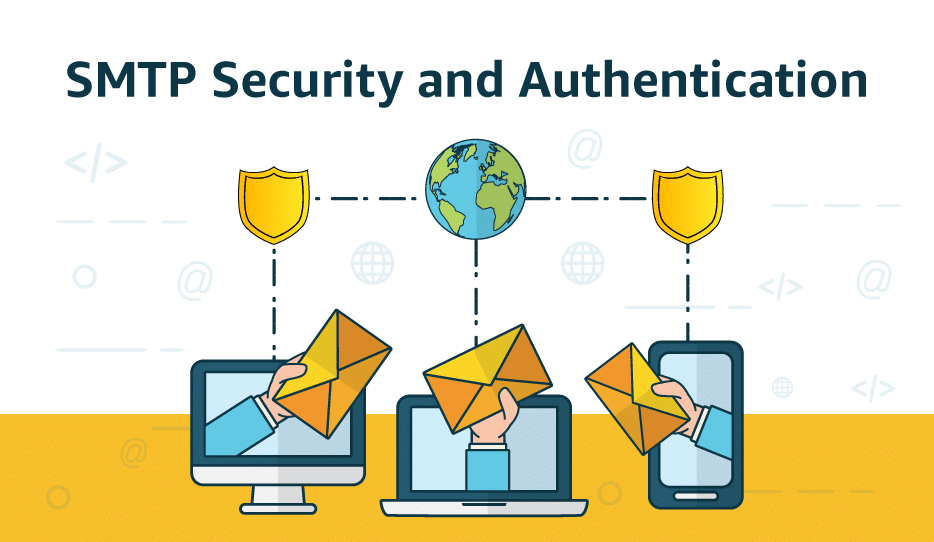
In today’s digitally interconnected world, email has become an indispensable means of communication for individuals and businesses alike. However, with the growing prevalence of cyber threats, ensuring the security and authenticity of email transmissions has become paramount. In this blog post, we will explore the vital importance of SMTP security and authentication in protecting sensitive information and maintaining the trust of email users.
Understanding SMTP (Simple Mail Transfer Protocol)
SMTP, the backbone of email delivery, is responsible for transferring messages between email servers. While it has played a vital role in facilitating seamless communication, its open nature has made it vulnerable to misuse and unauthorized access. Without adequate security measures, cybercriminals can exploit SMTP vulnerabilities, leading to various malicious activities such as email spoofing, phishing attacks, and unauthorized access to sensitive information.
The Rising Threat Landscape
With cyber threats evolving rapidly, it is crucial to stay one step ahead to safeguard sensitive data. The ever-increasing sophistication of attacks, coupled with the widespread use of email, call for robust security measures that can mitigate risks effectively.
Importance of SMTP security
SMTP security measures are designed to fortify the email infrastructure and prevent unauthorized access. One such mechanism is Transport Layer Security (TLS), which encrypts email transmissions, rendering them unreadable to unauthorized parties. By leveraging TLS, organizations can ensure that email exchanges remain confidential and protected from interception or eavesdropping.
Authentication: A key component
SMTP authentication plays a vital role in verifying the legitimacy of email senders and reducing the risk of email spoofing. By implementing authentication protocols such as SPF (Sender Policy Framework), DKIM (DomainKeys Identified Mail), and DMARC (Domain-based Message Authentication, Reporting, and Conformance), organizations can establish a strong foundation for trust and credibility. These protocols validate the sender’s identity, detect forged messages, and provide valuable information about the email’s handling and disposition.
Mitigating email spoofing and phishing attacks
Email spoofing and phishing attacks continue to be major concerns for individuals and businesses. These malicious activities deceive recipients into believing that an email is sent from a legitimate source, often leading to data breaches, financial losses, and reputational damage. By implementing robust SMTP security measures and authentication protocols, organizations can significantly reduce the success rate of such attacks, safeguarding their customers and protecting their brand reputation.
Compliance and regulatory requirements
Various industries are subject to compliance and regulatory requirements governing email security and privacy. Adhering to these standards is crucial not only to avoid penalties but also to ensure the protection of sensitive information. Implementing SMTP security measures and authentication protocols demonstrates a commitment to data protection and enhances the overall security posture of an organization.
The road ahead for your organization
By deploying DMARC, organizations can establish a strong framework that verifies the authenticity of outgoing emails and prevents malicious actors from impersonating their domain. DMARC works in conjunction with SPF (Sender Policy Framework) and DKIM (DomainKeys Identified Mail) to validate the alignment of the sender’s domain, ensuring that emails originate from authorized sources. It allows organizations to specify how receiving email servers should handle unauthenticated or suspicious messages.
Implementing DMARC not only safeguards the organization’s brand reputation but also enhances the security of sensitive data. By preventing email spoofing and phishing attacks, organizations can thwart attempts to trick recipients into revealing confidential information or executing malicious actions.
When you opt for DMARC Monitor by Logix, you empower your organization with valuable visibility into your email ecosystem through comprehensive reporting. These reports provide insights into email delivery, authentication failures, and potential threats. Armed with this information, your IT and security teams can fine-tune their email security measures, identify potential vulnerabilities, and take proactive steps to further strengthen your cyber defenses.